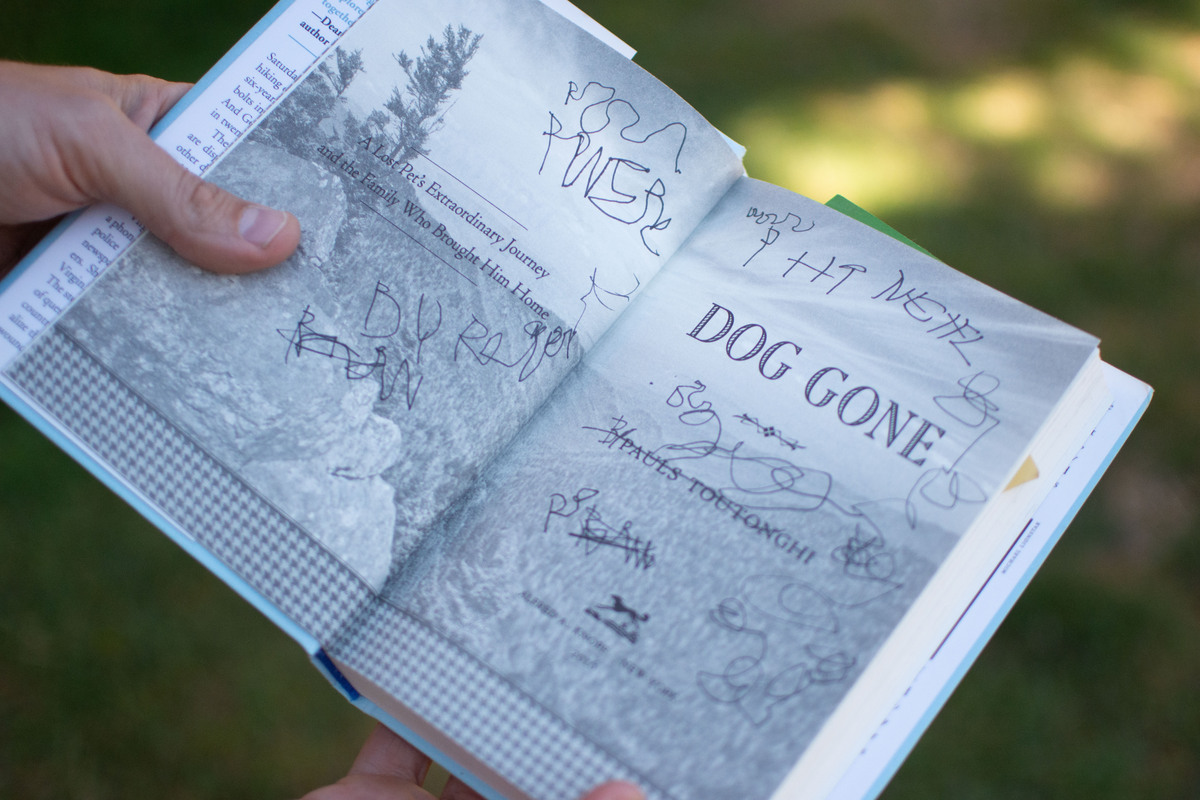
Associate Professor of English Pauls Toutonghi’s 2016 book “Dog Gone: A Lost Pet’s Extraordinary Journey and the Family who Brought Him Home” is being adapted into a film by Netflix.
The book tells the true story of Toutonghi’s in-laws searching for their dog Gonker, who disappears into the woods off the Appalachian Trail. The dog has Addison’s disease, which means he has to receive a monthly injection to live, giving the family a 23-day deadline to find him. Throughout the search, media attention rises and the family grows closer.
Nick Santora — whose writing credits include “The Sopranos,” “Prison Break” and “Scorpion” — emailed Toutonghi, asking if he could pitch a film adaptation of the novel to multiple studios.
“I said sure, I’m not gonna say no,” Toutonghi said. “He did that independently of me and when he pitched to Netflix, they really loved the idea.”
Almost two years ago, Netflix decided to option the book, which gave the studio access to the rights for a set time to make an adaptation. However, the pandemic did delay production. Netflix announced the film’s production this July. The film will likely be released in 2022.
“Dog Gone” will feature Rob Lowe (“The Outsiders,” “Parks and Recreation,” “The West Wing”) as the father, Kimberly Williams-Paisley (“Nashville,” “Father of the Bride”) as the mother and Johnny Berchtold (“The Look-See,” “Life as Mermaid”) as the son. Toutonghi has been impressed by the care and craft of the star-studded team.
However, every part of the process has been a learning experience for Toutonghi, one that still feels surreal.
“If you’d told me when I was 22 and dreaming of being a writer that my book would be made into a film in 23 years — I wouldn’t have believed you,” Toutonghi said. “But that’s the way my career has been consistently. I just feel so incredibly lucky to tell stories and have any degree of success in the world of books.”
Nadav Ben David ’25 is taking Toutonghi’s Creative Nonfiction class and has heard many details about the adaptation process. Overall, Ben David said he was impressed by Toutonghi’s expertise and success in the industry.
“He’s a very genuine author,” David said. “I don’t think he wrote things with the intention of being successful in that specific way. What’s really cool about it is, it was just a personal story. He’s just a creative; he’s just a guy with a good brain who wants to use his art form to articulate the experiences he’s had, the emotions and dynamics and human relationships he’s observed around him.”
Toutonghi detailed his on-set experiences in class. One anecdote described the greens department sawing off a tree branch to maintain consistent lighting between shots for continuity. When the cloud blocking the sun moved away, the greens department then had to hold the branch in place for the remainder of shooting that day.
For Toutonghi, being involved in such a large production was a novel experience.
“I went to the set, and it’s funny — I feel like the writer is both the most important and also the least important and needed person on that set,” Toutonghi said. “You’ve put the story together, but then now there are 100 people who are interpreting it and doing it and if you get involved at that point, you’re just going to create trouble.”
Throughout the process, Toutonghi also mentioned that the narrative of the film is slightly different because of the nature of the mediums and directing choices. For example, the film adaptation focuses more on the father-son relationship, while the mother-son relationship is more emphasized in the source material.
Toutonghi said he was intrigued by what parts they chose to keep in the movie and was amazed at the budget.
“I had a line in the book that they kept about a doughnut,” Toutonghi said. “Because they put this trick that Gonker did with a doughnut in the movie, it cost them like $35,000 in training the (stunt) dog to be able to do this (…) If it had been up to me, I would never have put that detail in the screenplay.”
Despite the adaptation marking a milestone in his career, Toutonghi said the most important part of the process is being able to share his experiences with his students.
“I think that it’s hugely important to be able to see this aspect of writing where you can conceivably make a living, because I think there are not a lot of avenues (…) as a writer,” Toutonghi said. “Working in film, in any capacity, especially in sort of an introductory capacity, is one of the ways that you can potentially make a living.”
Coral Barrett ’22 is in the same class as Ben David, and has been very interested in the adaptation process. Barrett’s previous experiences working on a film that did not end up being produced has made her eager to learn more about a successful film. Hearing Toutonghi’s experiences has given Barrett perspective.
“I think it’s been really valuable to see a potential path for myself even to just be like, ‘Oh wow, this is something I could do,’” Barrett said. “It almost gave me hope just hearing how nontraditional his journey was.”
Photograph by Hannah Korn
Subscribe to the Mossy Log Newsletter
Stay up to date with the goings-on at Lewis & Clark! Get the top stories or your favorite section delivered to your inbox whenever we release a new issue.

Leave a Reply